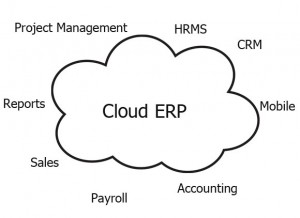Published Date : October 8, 2015
Categories : ERP Guides
 What Does the Cloud Imply?
In the past, cloud simply meant virtual servers located on distant places that can be accessed and managed through the internet. It simply meant that your data is stored somewhere in oceans, on the physical servers that you had to outsource. When it comes to business needs, that way, storing your data on the cloud gives you capabilities of managing your data real time without worrying about installing additional infrastructure on premises.
But when it comes to business applications, cloud computing simply means a single application that can be accessed through the browser from any location. It implies Software as a Service model, where you have to buy for using a software per user, per service basis.
The following video demonstrates the cloud ERP systems the most:
[embed]http://www.youtube.com/watch?v=ae_DKNwK_ms[/embed]
Benefits of Cloud ERP Software
There are a lot of benefits of implementing cloud ERP solutions in companies. Those benefits can be divided to technical benefits and benefits from the side of people.
Technical benefits include the fact that Cloud ERP solutions are accessible from anywhere. You can use them whether you are on a road, in the office, or at home. Moreover, companies can view and analyze the real-time data from the cloud, with any device available. This saves time, resources, and fosters effective communication inside the team.
Moreover, there is an increased security with cloud applications. There are multiple levels of security provided by the most ERP vendors.
There are benefits from people too. People using cloud ERP software become more productive, therefore, the operational costs of the company are also decreased. Controlling and managing the teams becomes easier, as managers will know who is doing what at the moment.
The availability of support is another nature of cloud ERP systems, that benefits most companies in many ways.
What Does the Cloud Imply?
In the past, cloud simply meant virtual servers located on distant places that can be accessed and managed through the internet. It simply meant that your data is stored somewhere in oceans, on the physical servers that you had to outsource. When it comes to business needs, that way, storing your data on the cloud gives you capabilities of managing your data real time without worrying about installing additional infrastructure on premises.
But when it comes to business applications, cloud computing simply means a single application that can be accessed through the browser from any location. It implies Software as a Service model, where you have to buy for using a software per user, per service basis.
The following video demonstrates the cloud ERP systems the most:
[embed]http://www.youtube.com/watch?v=ae_DKNwK_ms[/embed]
Benefits of Cloud ERP Software
There are a lot of benefits of implementing cloud ERP solutions in companies. Those benefits can be divided to technical benefits and benefits from the side of people.
Technical benefits include the fact that Cloud ERP solutions are accessible from anywhere. You can use them whether you are on a road, in the office, or at home. Moreover, companies can view and analyze the real-time data from the cloud, with any device available. This saves time, resources, and fosters effective communication inside the team.
Moreover, there is an increased security with cloud applications. There are multiple levels of security provided by the most ERP vendors.
There are benefits from people too. People using cloud ERP software become more productive, therefore, the operational costs of the company are also decreased. Controlling and managing the teams becomes easier, as managers will know who is doing what at the moment.
The availability of support is another nature of cloud ERP systems, that benefits most companies in many ways.